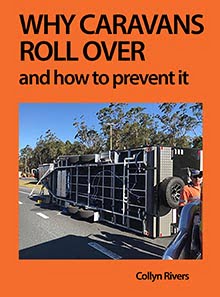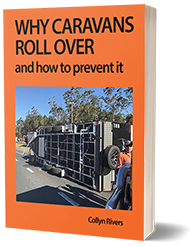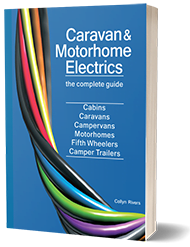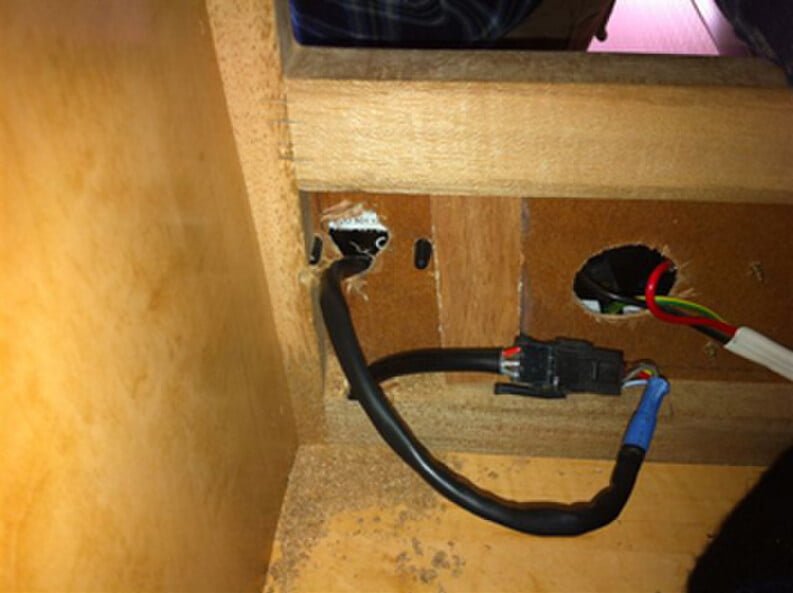RV Books
Proven & Unbiased Information from Collyn Rivers
♦ travel trailers ♦ motorhomes ♦ camper trailers ♦ solar ♦
Search our catalog of exclusive RV articles
Featured article
Articles by Category
<Click on a category below to see the related articles>
Electrical (general)
- Travel trailer fridge problems – how to fix the most common faults
- Travel trailer Fuses and Circuit Breakers – how to know which to use
- 12 volts dc from 24 volts dc
- AGM batteries for travel trailers – they are still worth using
- Battery charging and battery chargers – how to do it properly
- Blade fuse problems in travel trailers – they may burn or melt
- Dc-dc charging – how to speed alternator charging
- Electrical converter problems in travel trailers – problems when used for free camping
- Electrical converters in RVs – they’re unsuitable for free-camping
- Fast battery charging from generators – cheap, effective and relatively simply
- Grid connect solar modules for RVs – here’s how you can use them
- Imported RV electrics
- Interconnecting batteries in parallel or series – here’s how and why
- Inverters for travel trailers – and motor homes too
- LiFePO4 jump starters really do work – they power other things too
- Lighting for travel trailers – it makes every sense to install LEDs
- Lithium battery rival
- Make travel trailer fridges work as claimed – here’s how to do it
- Quietening travel trailer water pumps – easy and cheap to do
- RV Alternator Charging Problems
- RV Batteries
- RV electrical wiring – twin-wire or chassis return – here’s why twin-wire is usually better
- RV Fuel cells – great idea, but cost is too high
- RV supply cables – choices of current capacity and length
- Solar regulators with current shunts – how to fix misleading readings
- TV interference from LEDs – here’s what causes it
- Variable voltage alternator problems with travel trailers – how to fix
Batteries & Battery Charging
- 12 volts dc from 24 volts dc
- AGM batteries for travel trailers – they are still worth using
- Are Lithium-ion Batteries Worth Their Price – homes and properties
- Australian Battery Breakthrough
- Baghdad battery myth
- Battery capacity for home and property
- Battery capacity required for cabins and RVs
- Battery charging and battery chargers – how to do it properly
- Battery ventilation is vital – why take any risk?
- Best Batteries for Solar Power Storage
- Blade fuse problems in travel trailers – they may burn or melt
- Connecting travel trailer batteries – there’s no magic way of doing it!
- Dc-dc charging – how to speed alternator charging
- Electric and Hybrid Vehicles
- Electric Vehicle Batteries
- Electrical converter problems in travel trailers – problems when used for free camping
- Electrolysis corrosion in vehicles – how to find and fix it
- Fast battery charging from generators – cheap, effective and relatively simply
- Generator Battery Charging – Quickly and Deeply
- How long can lead acid batteries last
- How to tell travel trailer battery charge – energy monitoring explained
- Imported RV electrics
- Interconnecting batteries in parallel or series – here’s how and why
- Lead acid batteries for travel trailers – they are still a good buy
- LiFePO4 jump starters really do work – they power other things too
- Lighting for travel trailers – it makes every sense to install LEDs
- Lithium batteries for travel trailers
- Lithium battery rival
- Lithium battery safety in travel trailers – are they all the same?
- Lithium-iron batteries in RVs – they are safe to use
- RV Alternator Charging Problems
- RV Batteries
- RV electrical wiring – twin-wire or chassis return – here’s why twin-wire is usually better
- RV Fuel cells – great idea, but cost is too high
- Variable voltage alternator problems with travel trailers – how to fix
- What Peukert really meant – but is so often misunderstood
Trailer/Tow Vehicle Behaviour & Suspension
- Travel trailer and tow vehicle dynamics
- Travel trailer design need for change
- Travel trailer nose weight – it’s vital for safe towing
- Travel trailer suspension – it is mostly misunderstood
- Travel trailer weight safe to tow – depends on what tows it
- Travel trailer wheel placement
- Travel Trailer Length and Stability
- Travel Trailer Tow Ball Weight – how much
- 10 Tips for Safe Travel Trailer Towing
- Choosing a Travel Trailer Tow Vehicle
- Do Not Trust Travel Trailer Declared Mass
- Fifth wheelers are safer – here’s why they are
- Gross Combined Mass Upgrades
- How travel trailer and tow vehicles interact
- Is Travel trailer Independent Suspension Essential? – the answer is no.
- Loading a Travel Trailer Safely
- Making stable travel trailers – here’s how and why to do it
- Mechanical sway-control has little value at speed
- Motorhome and trailer tyres
- Need for a WDH – avoid using one if possible
- Overhung Travel Trailer Hitches
- Overweight RVs – a police point of view
- Reducing travel trailer sway – here’s how to minimise the causes
- RV Accident Data (Australia)
- RV Industry Changes Needed
- Should I grease my tow ball?
- Tow Vehicle/Travel Trailer Weight Ratio Explained
- Towing Without a WDH – Weight Distributing Hitch
- Trailer Dynamics Simply Explained
- Warning for Potential Travel Trailer Buyers – how to buy a travel trailer
- Weight Distribution Hitch limits cornering
- Weight distribution hitch setup – how much correction is needed
- Wheels falling off trailers – and how to stop it happening
- Why travel trailers sway and roll over – how to prevent it
Cooling and Heating
- Travel trailer air conditioning – here’s how
- Travel trailer fridge problems – how to fix the most common faults
- Carbon Monoxide Poisoning
- Diesel heating in travel trailers and motorhomes – it’s easy, effective and safe
- Make travel trailer fridges work as claimed – here’s how to do it
- RV Fridge Basics
- Safe RV heating – use diesel or LP gas
General
- Travel trailer air conditioning – here’s how
- Travel trailer design need for change
- Travel trailer facts and opinions – the nonsense so often on travel trailer forums
- Travel trailer suspension – it is mostly misunderstood
- 10 Tips for RVing Around Australia
- All solar house – self-building an off-grid all solar house
- Are Lithium-ion Batteries Worth Their Price – homes and properties
- Australian RV Road Rules – Summary
- Baghdad battery myth
- Buy a New RV in 5 Steps
- Buying used travel trailers – what to check
- Choosing a Travel Trailer Tow Vehicle
- Choosing the right interior fittings for an Australian RV
- Convert to your own all solar home
- Driving across Africa – in 1956/60 the very last time it was possible
- Electric and Hybrid Vehicles
- Electric Vehicle History
- Electric Vehicle Home Charging
- Electric Vehicle Motors
- Electrolysis corrosion in vehicles – how to find and fix it
- Energy and Power
- Ensuring Successful Solar Projects
- Fuel savers do not work – almost all are scams
- Generators for Cabins and RVs
- Generators for Home and Property Systems
- Going off the grid
- Have portable solar in your rented home
- How much solar capacity do I need?
- How much solar energy available?
- How much solar input – here’s how to find out
- How to free camp legally in Australia
- How to stop paying for electricity
- Inverters for Homes and Properties
- Is a 4 wheel drive needed for motorhomes
- Is Napisan a Safe Toilet Chemical?
- Lightning risk in RVs – how to reduce that risk
- Living with solar – how make it all work
- Napisan and Look-Alikes safe for Septic Tanks – a professor’s view
- Our Solar Equipped RVs
- Overhung Travel Trailer Hitches
- Problems with stand-alone solar – much applies also to RVs
- Quietening travel trailer water pumps – easy and cheap to do
- Retarding rust electronically – claims are exaggerated
- RV fault issues – who is responsible?
- RV forum common sense – a rare commodity?
- RV Layout – How to Choose the Best
- RV Solar and Alternator Charging
- RV Solar Basics
- RV Toilets – Which is Best?
- Safe toilet chemicals – can Napisan be used in septic tanks?
RV Solar
- Australian Battery Breakthrough
- Grid connect solar modules for RVs – here’s how you can use them
- How much solar input – here’s how to find out
- How to tell travel trailer battery charge – energy monitoring explained
- Lithium batteries for travel trailers
- Lithium battery safety in travel trailers – are they all the same?
- Our solar equipped RVs – all proved a major success
- Problems with stand-alone solar – much applies also to RVs
- RV Batteries
- Solar input available for travel trailers – know what’s available and increase it too
- Solar regulators with current shunts – how to fix misleading readings
Travel
- Travel trailer design need for change
- Travel trailer tare weight issues – some declared weights may not be correct
- Travel trailer wheel placement
- Travel Trailer Length and Stability
- Travel Trailer Tow Ball Weight – how much
- 10 Tips for RVing Around Australia
- Australian Road Rules Confuse
- Australian RV and towing rules and regulations – a general guide
- Australian RV Road Rules – Summary
- Best Way to RV Around Australia
- Buy a New RV in 5 Steps
- Choosing a Travel Trailer Tow Vehicle
- Choosing the right interior fittings for an Australian RV
- Claims for dual-cab ute towing capacity mislead travel trailer buyers
- Do Not Trust Travel Trailer Declared Mass
- Driving across Africa – in 1956/60 the very last time it was possible
- Electrical converters in RVs – they’re unsuitable for free-camping
- Free camp safely in Australia – this article shows how
- How to free camp legally in Australia
- How to Reverse a Travel trailer
- Is a 4 wheel drive needed for motorhomes
- Loading a Travel Trailer Safely
- Microwave for RV oven power draw – it’s more than many users think
- Motorhome and trailer tyres
- Need for a WDH – avoid using one if possible
- Overhung Travel Trailer Hitches
- Quietening travel trailer water pumps – easy and cheap to do
- Reducing travel trailer sway – here’s how to minimise the causes
- Retarding rust electronically – claims are exaggerated
- RV forum common sense – a rare commodity?
- RV Fridge Basics
- RV Layout – How to Choose the Best
- RV Toilets – Which is Best?
- Safe toilet chemicals – can Napisan be used in septic tanks?
- Sleep apnoea machines for camping – correct choice is vital
- Solar input available for travel trailers – know what’s available and increase it too
- Top 10 Australian RV Apps
- TV interference from LEDs – here’s what causes it
- Weight Distribution Hitch limits cornering
- What off-road really means
Health & Safety
- Travel trailer Fuses and Circuit Breakers – how to know which to use
- Travel trailer nose weight – it’s vital for safe towing
- Travel trailer weight safe to tow – depends on what tows it
- 10 Tips for Safe Travel Trailer Towing
- Battery ventilation is vital – why take any risk?
- Blade fuse problems in travel trailers – they may burn or melt
- Carbon Monoxide Poisoning
- Claims for dual-cab ute towing capacity mislead travel trailer buyers
- Diesel heating in travel trailers and motorhomes – it’s easy, effective and safe
- Fifth wheelers are safer – here’s why they are
- Free camp safely in Australia – this article shows how
- How to Reverse a Travel trailer
- Is Napisan a Safe Toilet Chemical?
- Lightning risk in RVs – how to reduce that risk
- LP Gas risk in travel trailers – deaths & brain damage still occurs
- Making stable travel trailers – here’s how and why to do it
- Mechanical sway-control has little value at speed
- Napisan and Look-Alikes safe for Septic Tanks – a professor’s view
- Overhung Travel Trailer Hitches
- Overweight RVs – a police point of view
- RV Accident Data (Australia)
- RV Industry Changes Needed
- RV supply cables – choices of current capacity and length
- Safe RV heating – use diesel or LP gas
- Safe toilet chemicals – can Napisan be used in septic tanks?
- Sleep apnoea machines for camping – correct choice is vital
- Towing Without a WDH – Weight Distributing Hitch
- Using correct size cables for RVs is essential
Legal & Compliance
- Travel trailer and motorhome compliance
- Travel trailer design need for change
- Travel trailer tare weight issues – some declared weights may not be correct
- Australian Road Rules Confuse
- Australian RV and towing rules and regulations – a general guide
- Australian RV Road Rules – Summary
- Buying used travel trailers – what to check
- Gross Combined Mass Upgrades
- Imported RVs – there can be major problems re-registering private imports
- RV Compliance – Here’s how to know
- RV electrical work – Victorian exception
- RV fault issues – who is responsible?
- Tow Vehicle & Travel Trailer Weight Definitions
The Camper Trailer Book
Electric Vehicles
Household Solar
- Ensuring Successful Solar Projects
- Refrigerators for Home and Property Solar
- Solar Regulators for Home and Property Systems
- Battery capacity for home and property
- Best Batteries for Solar Power Storage
- Going off the grid
- Vital things about solar in the USA
- TOP 10 SOLAR SCAMS
- Generators for Home and Property Systems
- Solar Modules for Homes and Properties
- Solar Shadowing – reducing the losses
- Grid connect solar problems – what vendors may not reveal
- Inverters for Homes and Properties
- How to stop paying for electricity
- Have portable solar in your rented home
- Convert to your own all solar home
- Fuel cells for homes and properties
- Upgrading solar system has unexpected traps
- Solar charge your electric car at home
Want to find out more? Our books cover all these topics and a lot more.
 Whether you’re buying your first RV or updating to a bigger, more comfortable rig, there are a great many things you need to know and consider. How to Choose and Buy an RV breaks things down so that you can decide what you want and whether or not what you’ve found is right for you.
Whether you’re buying your first RV or updating to a bigger, more comfortable rig, there are a great many things you need to know and consider. How to Choose and Buy an RV breaks things down so that you can decide what you want and whether or not what you’ve found is right for you.
 Solar That Really Works! explains every detail of designing and installing solar in boats, camper trailers, travel trailers and motorhomes.
Solar That Really Works! explains every detail of designing and installing solar in boats, camper trailers, travel trailers and motorhomes.
 Caravan & Motorhome Electrics covers every aspect of designing, installing and fault finding of the electrics in fifth wheel and conventional travel trailers, camper trailers and motorhomes.
Caravan & Motorhome Electrics covers every aspect of designing, installing and fault finding of the electrics in fifth wheel and conventional travel trailers, camper trailers and motorhomes.
 The Caravan & Motorhome Book covers every conceivable aspect of camper trailer, travel trailer and fifth wheel travel trailer, campervan and motorhome usage.
The Caravan & Motorhome Book covers every conceivable aspect of camper trailer, travel trailer and fifth wheel travel trailer, campervan and motorhome usage.
 Travel trailers and their tow vehicles rarely jack-knife and roll over – but when they do the results are catastrophic. The cause, and how to prevent it, is explained here. Why Caravans Roll Over offers solid advice for keeping yourself safe on the road.
Travel trailers and their tow vehicles rarely jack-knife and roll over – but when they do the results are catastrophic. The cause, and how to prevent it, is explained here. Why Caravans Roll Over offers solid advice for keeping yourself safe on the road.
learn more
 Solar Success explains how to design and build home and property systems that ensures affordable solar success first and every time.
Solar Success explains how to design and build home and property systems that ensures affordable solar success first and every time.
Between 1959 and 1961 Collyn Rivers and Antony Fleming drove a Bedford QLR off-road truck twice the length and breadth of Africa studying road surface conditions.
A 43 minute film about their adventure, produced and narrated by Antony Fleming, has been viewed on YouTube more than 1.6 million times!

To view the film, and also read Collyn’s telling of the tale, just click the button below.
 Whether you’re buying your first RV or updating to a bigger, more comfortable rig, there are a great many things you need to know and consider. This book breaks things down so that you can decide what you want and whether or not what you’ve found is right for you. It’s technically sound and comprehensive so that you can proceed with complete confidence. How to Choose and Buy an RV is the ultimate guide for those times when you want to, well, choose and buy an RV.
Whether you’re buying your first RV or updating to a bigger, more comfortable rig, there are a great many things you need to know and consider. This book breaks things down so that you can decide what you want and whether or not what you’ve found is right for you. It’s technically sound and comprehensive so that you can proceed with complete confidence. How to Choose and Buy an RV is the ultimate guide for those times when you want to, well, choose and buy an RV.
 Travel trailers and their tow vehicles rarely jack-knife and roll over – but when they do the results are catastrophic. The cause, and how to prevent it, is explained here. Why Caravans Roll Over offers solid advice for keeping yourself safe on the road.
Travel trailers and their tow vehicles rarely jack-knife and roll over – but when they do the results are catastrophic. The cause, and how to prevent it, is explained here. Why Caravans Roll Over offers solid advice for keeping yourself safe on the road.
 Caravan & Motorhome Electrics is the totally rewritten successor to the original globally selling Motorhome Electrics. The book’s content now also covers every aspect of designing, installing and fault finding of the electrics in fifth wheel and conventional travel trailers, camper trailers and motorhomes.
Caravan & Motorhome Electrics is the totally rewritten successor to the original globally selling Motorhome Electrics. The book’s content now also covers every aspect of designing, installing and fault finding of the electrics in fifth wheel and conventional travel trailers, camper trailers and motorhomes.
 Solar Success explains how to design and build home and property systems that ensures affordable solar success first and every time.
Solar Success explains how to design and build home and property systems that ensures affordable solar success first and every time.
 The Caravan & Motorhome Book covers every conceivable aspect of camper trailer, travel trailer and fifth wheel travel trailer, campervan and motorhome usage. Like all of Collyn Rivers’ books it is technically sound yet written in plain English.
The Caravan & Motorhome Book covers every conceivable aspect of camper trailer, travel trailer and fifth wheel travel trailer, campervan and motorhome usage. Like all of Collyn Rivers’ books it is technically sound yet written in plain English.
 Solar That Really Works! explains, in clear English, every detail of designing and installing solar in boats, camper trailers, travel trailers and motorhomes. It is up-to-date, valid globally and technically accurate. It is clear, concise and easy to follow without sacrificing important detail.
Solar That Really Works! explains, in clear English, every detail of designing and installing solar in boats, camper trailers, travel trailers and motorhomes. It is up-to-date, valid globally and technically accurate. It is clear, concise and easy to follow without sacrificing important detail.
This is Collyn Rivers’ newest book. Building on his years of experience and extensive knowledge of engineering and all things travel trailer and RV, this is the book you need with you when shopping for an RV.
Collyn Rivers has done it again! – if you need to know anything about motorhome electrics, then this book is for you… Collyn must be, without doubt, the foremost authority in Australia on this subject.
Why Caravans Roll Over….and How to Prevent It
Should be compulsory reading for everyone involved with Travel trailers: Design / Engineering, Marketing, Journalism (print & electronic), Regulations, Inspections, Driver-Training, Travel Trailer Clubs, Towing and Modifications.
Collyn is an accomplished engineer who knows how to design and build successful systems. It is refreshing to see practical advice written in plain language when there is so little solar information around. . . this is an essential text . . . you won’t find a better guide.
Without doubt, this is the best book we have ever read . . . it will be treasured, and read on a regular basis.

